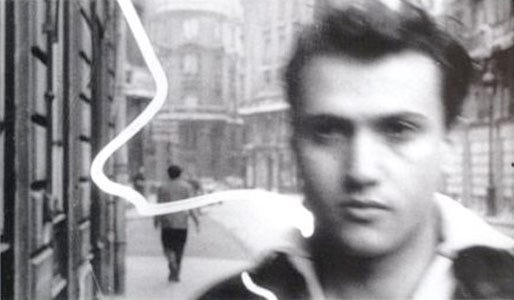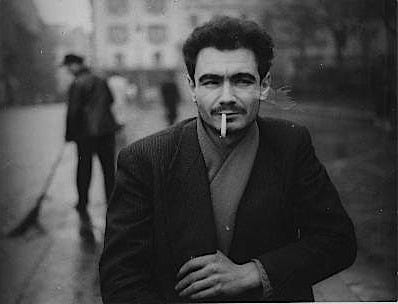SPEAKING EAST: The Strange and Enchanted Life of Isidore Isou by Andrew Hussey
Saturday, April 27, 2024
There was a boy
A very strange enchanted boy
They say he wandered very far
Very far
Over land and sea - Eden Ahbez
I just finished reading Andrew Hussey’s fascinating biography Speaking East: The Strange and Enchanted Life of Isidore Isou, and there are things I didn’t expect about Isou. He was the original platform with the avant-garde movement called lettriste, which came before Guy Debord’s Situationists. I have always considered the lettriste movement part of the Saint-Germain prés world of Boris Vian, Sartre, and others, but the more radical or out-there version of that world. On the surface, that is true, but it mostly came down to Isou, who was Jewish and came from Romania. He was a fellow who went through a horrific and traumatic life living in a world where the Jews were hunted and killed by the more racist Christian Romanians of the 1930s and 1940s. He barely escaped after being beaten and tortured by street thugs in a country that looked the other way when such actions took place. In such a monstrous landscape comes out a monster that is very much the personality of Isidore Isou.
Poet, writer, theorist, and filmmaker Isou came up with the lettriste theory/aesthetic that was very much due to his pro-Zionist feelings but even more militant than others. He witnessed the birth of Israel, but through his eyes, he saw Europeans happy with the Jews moving there, and therefore, they didn’t have to deal with the Holocaust issues. For Isou, the Holocaust never ended, and hence, the lettriste movement. Similar to DADA coming out of World War I, the aftereffects of that world were the only way artists/poets could express the destruction and madness of such a war.
Hussey wrote two other books of intense interest, Paris: The Secret History and his biography of Guy Debord, The Game of War. I recommend those two books and the Isou bio because they should be read together. The trio of books explores the underground political/aesthetic groupings. It gives the May 68 incident, concerning the students revolting, a sense of history and that it didn't come out of thin air. Still, I'm surprised at how much Hussey pulls his weight for Isou compared to Debord, who gets the short stick in this biography. I don’t know what Debord did or didn’t do, but I do know he’s a remarkable prose writer. I never read a book like Society of the Spectacle that is articulate about politics and society but poetic at the same time.
Besides this book, and a book focusing on lettrist films, Off-Screen Cinema: Isidore Isou and the Lettrist avant-garde, Treatise on Venom & Eternity, and Stewart Home's The Assault on Culture are basically, as far as I know, are the only books on Isou in the English language, and he wrote at least two hundred books but primarily published by small publishers in France. Then there is Saint Ghetto of the Loans by Isou's troubled friend but brilliant poet Gabriel Pomerand, and one can easily load a bookshelf with books by or about Guy Debord in English. I imagine translating Isou's more experimental works into English would be difficult or impossible. On the other hand, he even wrote a porn thriller, so why is that not translated into English?
Regarding Israel’s occupation of Gaza and the West Bank and how they are treating the Palestinians, as of this writing, over 34,000 have been killed. Although not related, I found reading this biography on Isou's background in Israel and how the Jews were mistreated for centuries. Isou felt that one had to fight back, and he looked down on those who moved to Israel instead of fighting in Europe for the Jewish presence in European culture and society. Equally sad is that Isou seemed to have a manic-depressive quality in his thinking, in which he feels he's the most important person in the 20th century or any other century. His egotism taints his art, which is quite remarkable, and one can see some of his visuals here in the book. But then again, how would I have turned out if I had gone through his early life? Trauma is a real bastard, and if one can turn to art or make something creative, it can at least be turned into a positive light.
But on the other hand, brutality comes from traumatic pasts, either as part of a culture or harm done to that person. Violence never leaves but seems to multiply in different forms that lead to abuse, depression, and, of course, death, such as the situation in Gaza/Israel. It's a fascinating book, and I want to read more about Lettriste.
With English subtitles:
IIsou'ssecond-in-command and poet sound artist Maurice Lemaitre. Here is his song:
Orson Welles interviews Maurice Lemaitre in English, with the participation of Isou.







Thanks Tosh. I only know the Letterist movement from my sporadic reading of the other more well known ones. You keep me on my toes.
A new one to me, thanks for sharing this.